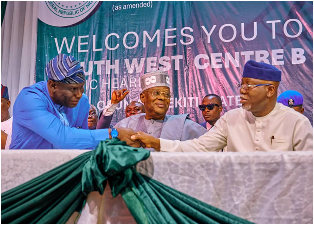* Aiyedatiwa advocates 50% revenue for states
* Taditional rulers, NUJ, women groups, others submit memoranda
By Josephine Oguntoyinbo & Adedotun Ajayi
Stakeholders from Ondo, Ekiti and Osun States, on Friday made strong demands for restructuring, fiscal federalism, state policing and resource control during the South-West Centre B Public Hearing on the Review of the 1999 Constitution (as amended), held in Akure, Ondo State.
The hearing, organised by the House of Representatives Committee on Constitutional Review, brought together state officials, traditional rulers, civil society groups, professional bodies and labour unions, who presented various memoranda and recommendations.
Ondo State Governor, Dr. Lucky Aiyedatiwa, in his submission, stated that constitutional amendments must reflect the values and socio-economic realities of Nigerians
He advocated true federalism, restructuring of the revenue-sharing formula, and increased autonomy for states.
He called for a review of the current revenue allocation formula, recommending that states retain at least 50 per cent of revenue generated and remit about 40 per cent to the Federal Government.
Aiyedatiwa said, ‘The current revenue allocation is skewed in favour of the centre and that must be c
He also supported the establishment of state police, noting that the existing centralised police system is no longer effective in addressing internal
“The centralised police institution has become overwhelmed and underfunded. States, being closer to the people, understand their local security needs,” he said.
He cited the Amotekun Corps in the South-West as an example of a successful local security initiative.
On natural resources, Aiyedatiwa called for the removal of minerals from the Exclusive Legislative List to the Concurrent or Residual List. He said this would allow states to explore and manage their resources effectively.
“Ondo State is blessed with resources like limestone, granite, bitumen, kaolin and marble, but faces challenges due to federal bottlenecks and illegal mining,” he stated.
The governor also requested constitutional recognition of the 33 Local Council Development Areas (LCDAs) created in Ondo State, similar to the proposed recognition of LCDAs in Lagos State.
He opposed any constitutional proposal that would alter the current territorial boundaries of Ondo State.
Governor Abiodun Oyebanji of Ekiti State, represented by Attorney General and Commissioner for Justice, Mr. Dayo Apata, called for increased political representation for women and persons with disabilities, recognition of traditional rulers, and regulation of herders’ movements across the country.
Osun State Governor, Senator Ademola Adeleke, represented by his Deputy, Mr. Kola Adewusi, proposed a reduction in the cost of governance and political campaign expenses, noting that high campaign costs can lead to electoral misconduct.
Traditional rulers, led by the Olowo of Owo and Chairman of the Ondo State Council of Obas, Oba Gbadegesin Ogunoye III, requested constitutional recognition and inclusion in national policy processes, citing their roles at the grassroots level.
The Nigeria Union of Journalists (NUJ), in its submission, called for constitutional protection for press freedom and the establishment of a bailout fund for independent media organisations.
Presenting on behalf of the NUJ National President, Comrade Alhassan Yahya Abdullahi, the Ondo State Chairman, Prince Leke Adegbite, emphasised the need to ensure journalists’ safety, protection of equipment and freedom from political and economic pressure.
“The media is crucial in holding government accountable. A bailout fund will help preserve editorial independence and protect jobs,” he said.
The Nigerian League of Women Voters, through its Chairperson, Mrs. Titilayo Owolabi, submitted a petition with 33,000 signatures demanding greater inclusion of women in governance.
Other groups, including the Nigeria Union of Local Government Employees (NULGE), also submitted proposals for constitutional amendments.
Common themes in the submissions included the call for devolution of powers, restructuring, and improved governance practices. The Deputy Speaker of the House of Representatives, Rt. Hon. Benjamin Okezie Kalu, chaired the hearing.

